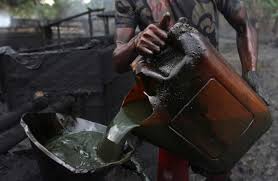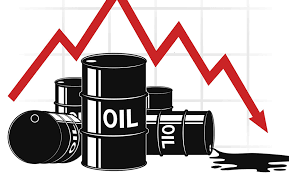Decline in Nigeria’s oil exports
Nigeria’s non-oil exports have been on a consistent decline in recent years, despite efforts by the government to diversify the economy away from its heavy reliance on oil. As of the first half of 2024, non-oil exports accounted for only 9.65% of total exports, compared to 15.30% in 2020. This highlights a troubling trend, where Nigeria has continued to be overly dependent on crude oil, even as other sectors remain underdeveloped or inefficient. Nigeria’s non-oil exports have been on a consistent decline in recent years, despite efforts by the government to diversify the economy away from its heavy reliance on oil. As of the first half of 2024, non-oil exports accounted for only 9.65% of total exports, compared to 15.30% in 2020. This highlights a troubling trend, where Nigeria has continued to be overly dependent on crude oil, even as other sectors remain underdeveloped or inefficient.
Decline in Oil Exports
The decline in non-oil exports mirrors the challenges facing Nigeria’s oil exports, which have been suffering from a combination of lower global demand, aging infrastructure, and theft. Nigeria’s oil production has dropped significantly over the years. According to the Organisation of the Petroleum Exporting Countries (OPEC), Nigeria’s production dropped from over 2.1 million barrels per day in 2019 to just under 1.2 million barrels per day in 2024. Historically, Nigeria’s largest buyers were in Europe and Asia, but factors like environmental concerns and the push for greener energy has led some countries to reduce their reliance on Nigerian crude oil. Notable among these are:
- The United States: The U.S. has significantly reduced its oil imports from Nigeria, a trend that began during the Obama administration and accelerated with the rise of shale oil production in the U.S. As a result, Nigeria, once one of the top suppliers to the U.S., has seen its market share in this key market diminish. In 2013, the U.S. imported more than 500,000 barrels per day from Nigeria; by 2023, this had dropped to under 50,000 barrels per day.
- European Union (EU): The EU, which had been a major buyer of Nigerian oil, is also moving toward reducing its dependence on fossil fuels. The EU’s Green Deal and commitment to phasing out fossil fuel imports by 2030 are expected to diminish Nigeria’s share in the European market. Countries like Germany, Italy, and France have already begun sourcing more oil from the Middle East and other regions that can meet the demand for cleaner alternatives.
- China: While China remains a major customer, it has diversified its sources over the years, seeking to reduce its dependency on Nigerian crude as part of its broader strategy to secure energy supplies from a variety of sources. This diversification is partly driven by concerns about security in Nigeria’s oil-producing regions and the volatility of oil prices.
Loss of Customers and Global Shift in Energy Consumption
Nigeria’s loss of key customers, coupled with a global shift towards renewable energy and stricter environmental regulations, has put pressure on the country’s oil revenues. The nation’s oil output has been further hindered by issues like pipeline vandalism, oil theft, and underinvestment in critical oil infrastructure, resulting in inefficiencies and disruptions in production. Nigeria’s inability to fully capitalize on oil price surges in recent years, such as those seen during the COVID-19 recovery period, has exacerbated its economic challenges. While global oil prices have rebounded, the loss of reliable customers and the failure to increase production to meet demand have left Nigeria grappling with declining revenues from its primary economic asset.
The Oil War
Several Nigerian politicians have voiced opposition to the transition from crude oil to renewable energy, reflecting concerns about the economic and social implications of such a shift. One of the prominent Nigerian Association of Petroleum Explorationists voices is Elliot Ibie, President of the (NAPE). He expressed strong support for fossil fuels, particularly natural gas, as a “transition fuel” in the country’s energy mix. He argued that despite the global momentum toward clean energy, fossil fuels would remain essential for a long time due to Nigeria’s reliance on them and the limited current alternative energy infrastructure. This stance is in direct opposition to the broader push for decarbonization and the reduction of oil dependency. Similarly, Emmanuel Kachikwu, a former Minister of State for Petroleum, has consistently highlighted the challenges of a rapid energy transition in a nation heavily dependent on oil. While Kachikwu recognizes the global push towards renewable energy, he advocates for a more gradual approach, underscoring that transitioning away from oil must be done carefully to avoid economic disruption.
Oil Money Blood Money
Nigeria’s crude oil wealth has been a source of immense corruption, fueling economic hardship and social unrest. The embezzlement of oil revenues happens through corrupt licensing deals, fraudulent contracts, and large-scale oil theft. Government officials and elites siphon off funds meant for national development, worsening poverty and inequality. Greed, nepotism, and political power struggles are at the heart of this corruption.

Oil also played a significant role in the Nigerian Civil War (Biafra War) from 1967-1970, where control of oil-rich regions became a key factor. The Nigerian government could not afford to lose access to the oil reserves in the Eastern Region, which fueled tensions. Foreign powers, attracted by oil, influenced the conflict, making it an international issue. After the war, corruption continued as the government consolidated control over oil revenues, but rather than rebuilding, funds were misused, deepening Nigeria’s economic problems. In essence, Nigeria’s oil wealth, instead of bringing prosperity, has often been mismanaged, leading to corruption, inequality, and prolonged economic struggles.








